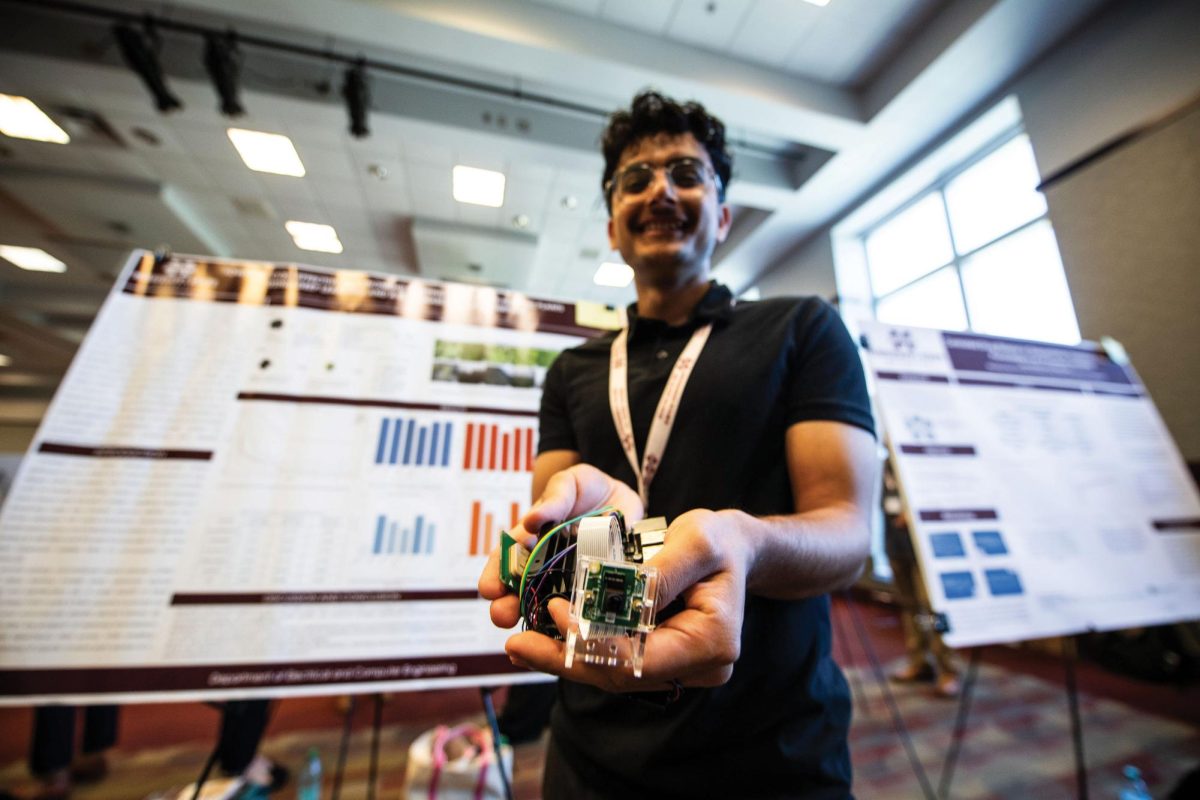Outside the western wall of the Mississippi State University Landscape Architecture Building, the MSU Community Garden brings agricultural education to life.
As garden coordinator, graduate student Eloisa De Leon organizes weekly community service days at the garden, where students and community members get hands-on gardening experience and conduct research into small-scale water collection and distribution.
“Since we are still in construction, we do a little bit of gardening, a little bit of construction,” De Leon said. ”It all depends what we need.”
The community garden consists of 13 raised beds. Two more beds are currently being built, and after their completion, 15 additional beds will be built on the other side of the gravel path, mirroring the existing beds.
The garden was created as a collaborative effort between the College of Architecture, Art and Design; the College of Agriculture and Life Sciences; and the MSU Student Association.
Once the decision to start the garden was made, three faculty members – Tongyin Li, an assistant professor in the Department of Plant and Soil; Cory Gallo, an associate professor in the Department of Landscape Architecture; and Brent Fountain, an associate professor in the Department of Food Science, Nutrition and Health Promotion—were appointed to a committee to plan the garden.
Li said the professors decided the key uses for the community garden would be to facilitate research, education and community interaction.
Although the garden was originally planted less than a year ago in April 2017, those running the garden believe many members in the MSU community are already reaping its benefits.
Several classes were taught in the community garden last semester. De Leon said by helping with one of the classes, a first-year experience course, she was able to see first-hand how beneficial hands-on experience can be for students who may not have been exposed to a lot of gardening growing up, if any at all.
“We had a lot of people who didn’t even know how broccoli grows, or how beans grow,” De Leon said.
There are not any agricultural classes being taught in the garden this semester, but a design and build class is working to complete the garden.
Mackenzie Nelson, an undergraduate student, is currently building hoop houses in the garden.
Nelson said she and Gallo began researching hoop houses to increase the total number of crops that can be grown in a relatively small space. Nelson said while she and Gallo looked to other community gardens for inspiration, they put their own spin on the ideas they saw.
“We had seen some example of people having a trellis at the entry to the garden to welcome people in,” Nelson said. “What happens if we put that trellis over the beds and made a walkway through, and the plants could grow over and that could be the way we harvest?”
While only one of the eight planned hoops has been built, Nelson said the remaining hoops will be built fairly quickly, since they now have a finalized design.
De Leon said once the garden is completed, which she said might be as soon as next semester, undergraduate students will more directly run the garden.
“Eventually, we want to have the garden be run by students, and have it available to be rented,” De Leon said.
De Leon said beds will be rented out to student organizations and community groups whose goals line up with those of the community garden.
Last semester, Li and a group from the plants and soils department researched water filtration in soil in the garden. Li said they used a capillary irrigation system to water one group of crops, while another group was watered by hand.
“We were trying to see which one would give you better crops, or at least reduce the effort so you don’t have to go out and water all of the time,” Li said.
The group studied lettuce, cabbage, kale and broccoli. Unfortunately, the cabbage, kale and broccoli did not produce sizable enough harvests from either method for conclusions to be drawn. Li said she believes this is because they were planted too late in the year.
However, lettuce grew well and to roughly the same level regardless of the watering method. Li believes gardeners can utilize this research to save time by installing systems instead of watering all their plants by hand.
“For some crops, during the time when they are small, they may still require some hand watering, but having the sub irrigation system could help people reduce the number of times they have to water plants in their own backyards,” Li said.
The lettuce grown in the garden was donated to a local food pantry to benefit the community beyond education.
Community service days, where volunteers can learn more about gardening while helping with the garden, take place 3 to 5 p.m. every Tuesday this semester.
De Leon believes the first-year experience course and other classes will return to the MSU Community Garden in the fall.
Agricultural education comes to life in the Mississippi State University Community Garden
0
Donate to The Reflector
Your donation will support the student journalists of Mississippi State University. Your contribution will allow us to purchase equipment and cover our annual website hosting costs.
More to Discover













